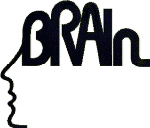This article needs additional citations for verification .(August 2025) |
| Brain Records | |
|---|---|
 | |
| Parent company | Metronome Musik GmbH |
| Founded | 1972 |
| Founder | Bruno Wendel, Günter Körber |
| Status | Inactive |
| Distributor(s) | PolyGram Records |
| Genre | Krautrock, Kosmische Musik |
| Country of origin | West Germany |
| Location | Hamburg |
Brain was a Hamburg-based record label prominent in the 1970s releasing several important Krautrock records by bands such as Neu!, Cluster and Guru Guru. Many of its more prominent records are currently being reissued on CD by Repertoire Records.
Contents
- Discography
- 60.000 – series
- 80.000 – series
- 200.100 – series
- Albums Sampler
- See also
- References
- External links
In the middle of 1971, Rolf-Ulrich Kaiser's management style at Ohr caused two of his A&R men, Bruno Wendel and Günter Körber, to leave Ohr and set up their own record company, which they called Brain. Wendel & Korber brought Guru Guru with them from Ohr, and immediately signed Cluster, who had recorded one LP for Philips; they soon recorded and released Cluster II. [1]
Brain was rapidly a success throughout West Germany and much of western Europe, although had little presence in the US. Signings throughout the seventies and into the eighties included Neu!, Cluster, Harmonia, Klaus Schulze, Edgar Froese, Guru Guru, Grobschnitt, Novalis, Jane, Birth Control, Embryo, Popol Vuh, Curly Curve, Scorpions, Electric Sun, Accept and many more.
A later reissue series called Rock On Brain saw many early Brain recordings reissued, although mostly with entirely different sleeves and even album titles. Brain also reissued a number of recordings licensed to their parent company Metronome, such as Amon Düül's first album Psychedelic Underground. Many came out on the M2001 label which is closely linked to Brain.
Brain licensed and issued a number of British releases for the West German market, in this case mainly featuring the original sleeves. These included Greenslade, Caravan, If, Spirogyra, Atomic Rooster, Alexis Korner, Gryphon and Steamhammer. There were of course exceptions - the Brain issue of Atomic Rooster's Nice n Greasy features an entirely different sleeve to the UK issue, and If's Double Diamond didn't receive a UK release at all.
Some Brain releases later proved highly influential. Brain 1004 was Neu!'s eponymous debut Neu! ; Brain 1062 was Neu! 75 , which undoubtedly contributed to the sound of punk rock.
Körber left in 1976 to start Sky Records, which released much Cluster-related music plus Michael Rother's early solo work, and bands like Streetmark. When he left the labels of Brain LPs changed from green to orange. [2]